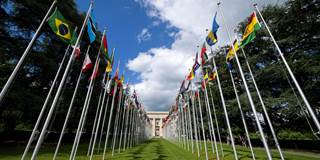The common norms on which international cooperation has been based for seven decades are increasingly being challenged not only by rising powers, but also by the countries that once promoted them. Does that mean that countries have no choice but to steel themselves for a coming age of dysfunctional alliances, proxy conflicts, or even war?
OXFORD – Between escalating trade disputes and the divisions at the G7’s summit this month, the breakdown of global governance has become starkly apparent. The United States can no longer be counted on to uphold, much less enforce, existing rules, and countries more broadly cannot be assumed to agree on, much less adhere to, a common set of norms. Does this mean the rules-based world order is doomed?
Over the last seven decades, democratic values have underpinned efforts, led by the US and Europe, to deepen international cooperation. Since the end of the Cold War, when the West claimed victory for liberal democracy, US and European leaders have often cited “shared values” in forums like NATO and the G7 (known as the G8 until Russia was suspended in 2014 for breaching those values in Ukraine).
But the world has changed. Russia no longer needs to be part of the club of Cold War “victors” to advance its geostrategic interests. China was never a member, and yet it has risen to the status of a major world power. These countries, along with other major emerging economies, are increasingly challenging the geopolitical dominance the West thought it had secured.

OXFORD – Between escalating trade disputes and the divisions at the G7’s summit this month, the breakdown of global governance has become starkly apparent. The United States can no longer be counted on to uphold, much less enforce, existing rules, and countries more broadly cannot be assumed to agree on, much less adhere to, a common set of norms. Does this mean the rules-based world order is doomed?
Over the last seven decades, democratic values have underpinned efforts, led by the US and Europe, to deepen international cooperation. Since the end of the Cold War, when the West claimed victory for liberal democracy, US and European leaders have often cited “shared values” in forums like NATO and the G7 (known as the G8 until Russia was suspended in 2014 for breaching those values in Ukraine).
But the world has changed. Russia no longer needs to be part of the club of Cold War “victors” to advance its geostrategic interests. China was never a member, and yet it has risen to the status of a major world power. These countries, along with other major emerging economies, are increasingly challenging the geopolitical dominance the West thought it had secured.